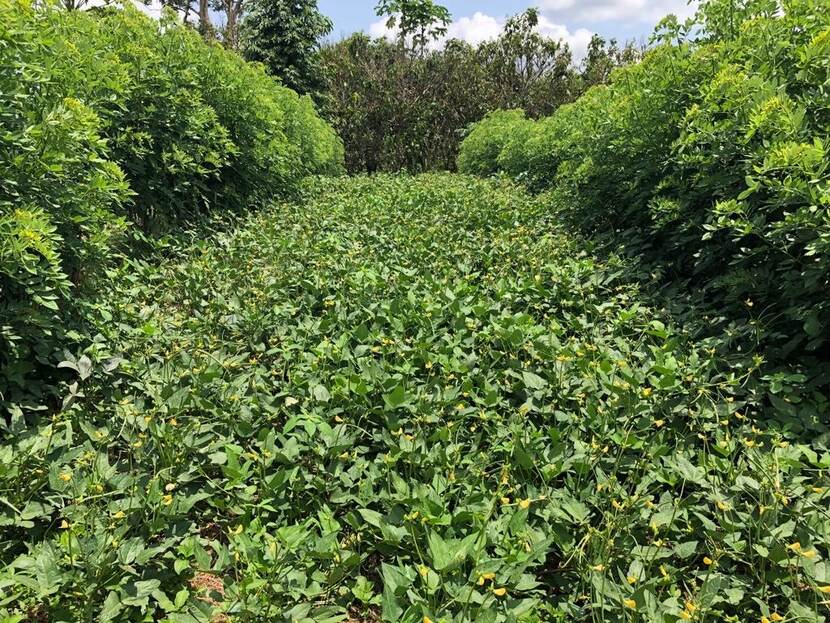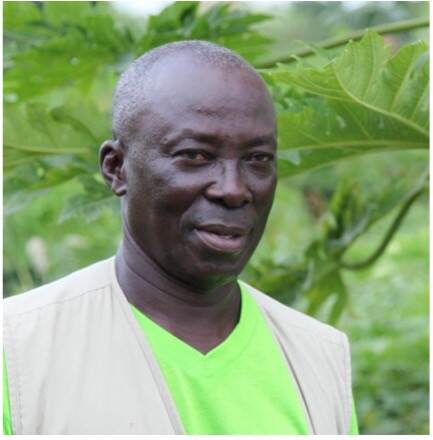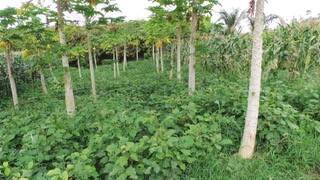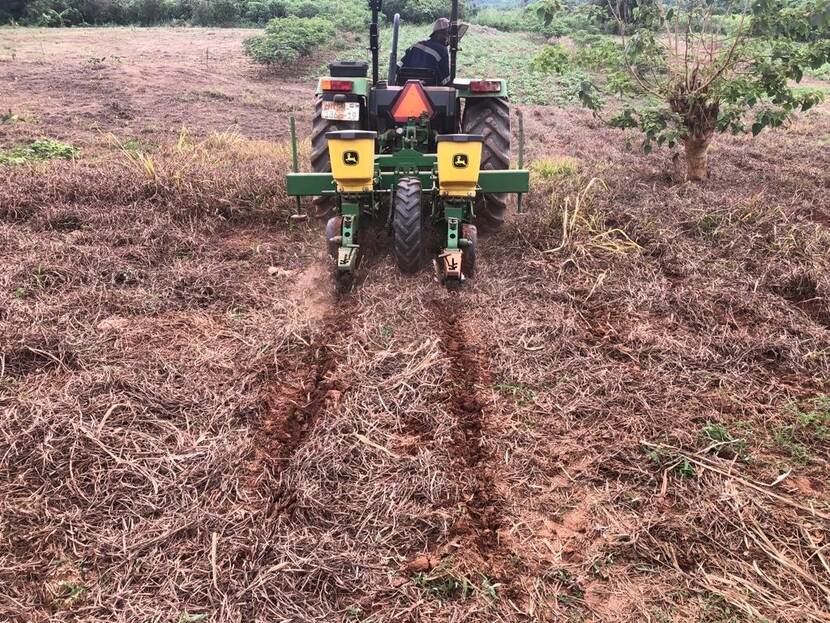Fostering resilient agricultural systems and environmental stewardship in Ghana
In Ghana, nature-inclusive farming can move beyond being a small niche and become a significant contributor to sustainable agriculture and food security. For that, the government needs to help farmers adapt their agricultural systems to nature, strengthen national capacities for management and create effective safety nets for smallholder farmers.

In Ghana, nature-inclusive farming can move beyond being a small niche and become a significant contributor to sustainable agriculture and food security. For that, the government needs to help farmers adapt their agricultural systems to nature, strengthen national capacities for management and create effective safety nets for smallholder farmers.
Kofi Boa is the founder and director of the Howard G. Buffett Foundation Centre for No-Till Agriculture in Ghana. His parents were smallholder farmers, and he has been a lifelong advocate for smallholder farming. At the age of 12, his mother's cocoa farm was burned by a bushfire, making life very difficult for the family. This experience instilled in him a strong aversion to using fire for land preparation, and he vowed to fight against the slash and burn method for the rest of his life.
He soon learned about a system called proka (no-till with mulch), which involves clearing the forest and letting it stay like that for about a year. The goal is to let the cleared vegetation rot, allowing for the planting of cocoa seedlings the following year. However, Kofi found the one-year waiting period too long and sought ways to manage the cut vegetation and plant crops immediately after clearing on traditionally burned fields. He has been farming this way ever since.

The status of nature-inclusive farming in Ghana
To Kofi, nature-inclusive farming refers to any form of sustainable farming that aims to build resilience in food and ecosystems, ensuring beneficial impacts on the soil, climate, and biodiversity, including human beings, livestock, and plants. Kofi: ‘It seeks to replicate the conditions of forests or fallow lands on continuously cropped arable land, making arable land nearly as sustainably productive as fallow land.’
In addition to the use of fire for clearing arable lands, the shifting cultivation system was popular in Ghana decades ago. Kofi: ‘However, increasing human population and related factors have made the shifting cultivation system non-viable in recent times. As a result, farming on the same parcels of land year after year has become common, accompanied by practices of industrial agriculture that rely on annual tillage of the soil and high-input, high-output models. These practices, along with traditional slashing and burning, have led to soil degradation, increased vulnerability to climate variations, and decreased farm productivity.’
‘Nature-inclusive farming seeks to replicate the harmony of forests and fallow lands, creating sustainable productivity on arable lands while nurturing the soil, climate, and biodiversity’ - Kofi Boa
Significant progress in recent years
Nevertheless, nature-inclusive farming in Ghana has witnessed significant progress over the past decade and a half. Kofi: ‘The Centre for No-Till Agriculture in the Ashanti region, known as Amanchia, has played a crucial role in championing nature-inclusive farming during this period. The center showcases the benefits, evidence, and implementation processes of nature-inclusive agriculture. It promotes understanding among people and boosts their confidence through practical training and on-farm technical support.’
‘Various agencies and projects, such as GIZ, the Vibrant Villages Foundation, The Ghana Agricultural Sector Investment Programme, and others, support farmers with capacity building and start-up kits to implement nature-inclusive farming on their lands.’
‘In addition, different variations of nature-inclusive farming technologies are emphasized, depending on the supporting agency. These include conservation agriculture, climate-smart agriculture, regenerative agriculture, agroecology, and agroforestry. The introduction of eco-friendly mechanized equipment, such as the ripper, roller crimper, and no-till planter, by the Centre for No-Till Agriculture has dispelled the notion that nature-inclusive farming is not scalable. This positive response has led to mechanized conservation agriculture. An example of this is the World Bank-African Conservation Tillage Network's proposed Sustainable Conservation Agriculture Mechanization project, which is set to be piloted in Ghana and launched in Accra in May 2023.’

Limited support for promotion and development
Why is nature-inclusive farming not mainstream? Kofi: ‘The primary obstacle is the belief held by many people that nature-inclusive farming cannot feed the world. As someone deeply involved in agriculture, I have encountered this sentiment numerous times, with high-ranking agricultural personnel stating: "We want to feed our people, so we do not want to entertain any deviations from the conventional system." The problem lies in conventional farming being seen as the ultimate solution to food production, and without it, the fear is that hunger will prevail. Furthermore, nature-inclusive farming is often perceived as exclusive to smallholder farming, which some skeptics argue cannot be scaled up in any meaningful way. Consequently, there is limited policy support for the development and promotion of nature-inclusive farming compared to conventional agriculture.’
‘What the skeptics fail to recognize,’ says Kofi, ‘is that, just like mechanized conventional farming, nature-inclusive farming can also be mechanized and scaled up in terms of land area. Mechanization is essential for both systems to be implemented on a large scale.’
Focus on policies and investments
The question is: what is needed to make nature-inclusive farming more than just a small niche? Kofi: ‘The negative effects of climate change, including increasing temperatures, weather variability, changing ecosystems, invasive crops and pests, and reduced yields, necessitate appropriate practices supported by sound national agricultural policies if agriculture is to continue providing food and livelihood benefits. Therefore, it is crucial for the government to prioritize the institutionalization of nature-inclusive farming within agricultural systems to ensure sustainable food and income security, which are vital for national development. In this context, government should focus on policies and investments that:
1. Help farmers adapt their agricultural systems to nature.
- For that, they should invest in knowledge sharing and raise awareness. The policy framework should involve farmers in technology development and verification at the on-farm level. This will build their confidence in nature-inclusive farming and make them owners and advocates of the technology. Establishing mini centers of excellence in rural communities would showcase the evidence and benefits of nature-inclusive farming practices. Facilitate farmer-to-farmer extension through field visits, community gatherings, and field days to share successful strategies. The government should also promote knowledge sharing through radio, television, and other appropriate media channels.
- Also, the extension message delivery systems should be harmonized. Extension services should focus exclusively on nature-inclusive practices, eliminating situations where field officers promote both conventional and natural farming messages within the same operational area.
2. Strengthen national capacities to manage nature-inclusive farming.
- The government should invest in research with adequate funding, emphasizing the enhancement of local knowledge and advancements in science that significantly impact climate change. Create a platform to merge scientific knowledge with farmers' indigenous knowledge and experience. Existing Research-Extension-Farmer Linkage Committees (RELCs) could be empowered to assemble scientific and local knowledge, formulating zonal-specific nature-inclusive farming strategies.
- Also, they should incorporate natural farming into the educational curriculum: integrate nature-inclusive courses into the national educational curriculum at all levels to cultivate the right mindset, especially among the youth.
3. Provide effective safety nets for smallholder farmers.
- Governments must ensure a guaranteed market for natural farming products: establish a reliable market with guaranteed prices for natural farm produce. Government food procurement agencies should commit to sourcing a significant portion, if not all, of their requirements from natural farming.
- In addition, they should offer incentives for natural farming: provide easily accessible grants and affordable loans for natural farming. Enact and enforce rules and regulations that discourage practices leading to the degradation of natural resources.
By implementing these policies, nature-inclusive farming can move beyond being a small niche and become a significant contributor to sustainable agriculture and food security.

Contact
Would you like to know more about the current developments in the domain of agriculture and nature in Ghana or contact the agricultural team at the Netherlands Embassy in Accra?
You can visit the country page of Ghana at the website agroberichtenlandbuitenland.nl of the Netherlands ministry of Agriculture, Nature and Food Quality. You can also send an email to ACC-lnv@minbuza.nl
This article is part of the latest edition of e-magazine Agrospecial (June 2023) about nature-inclusive farming. The teams of our Netherlands Agricultural Network showcase nature-inclusive practices and initiatives in 36 countries worldwide. They delve into the development, benefits and challenges of this innovative farming approach. Each team has a different story to tell. Click here to read more about insights into the potential of nature-inclusive farming practices worldwide!